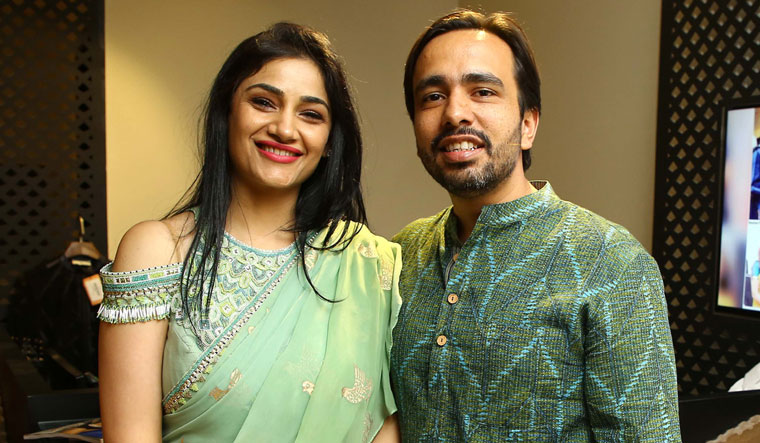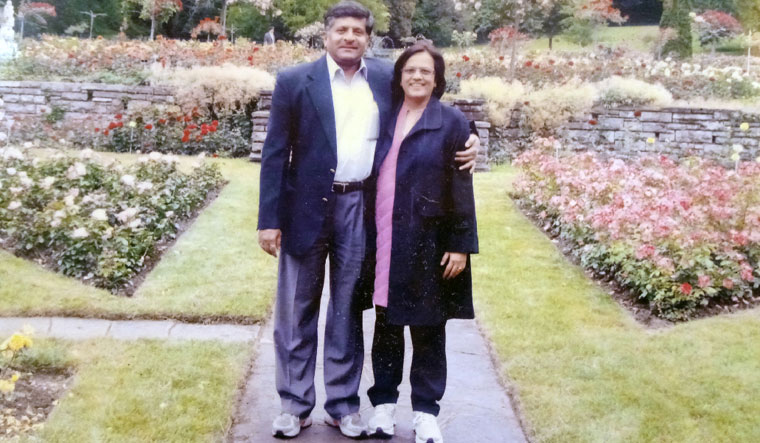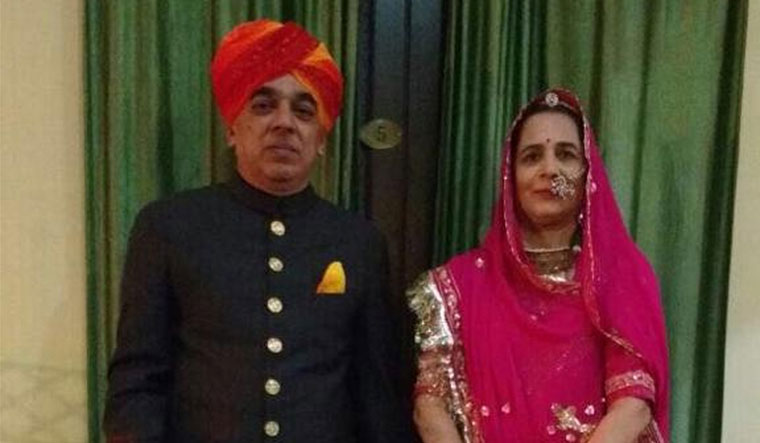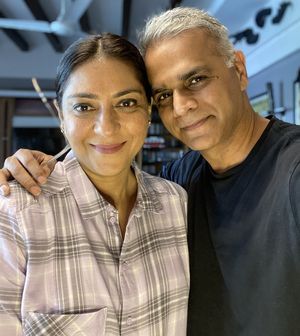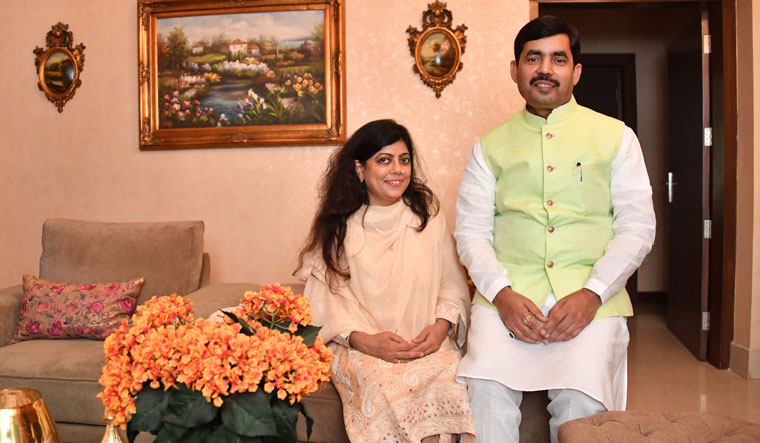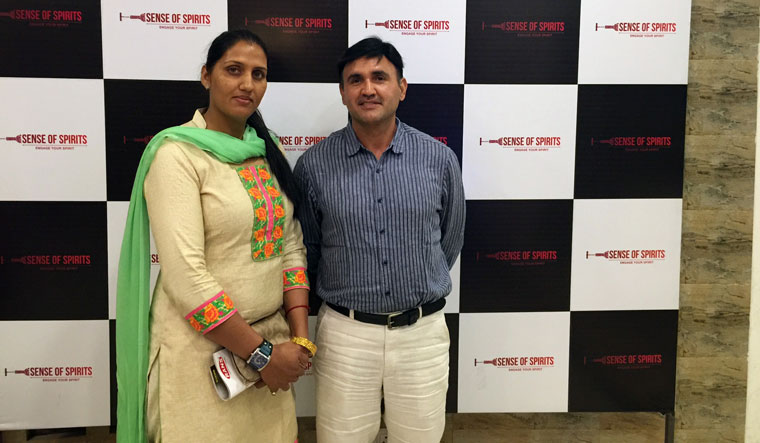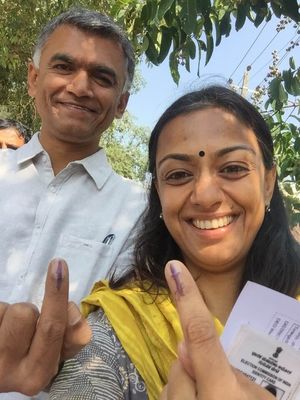US President-elect Joe Biden, in his acceptance speech after clinching the presidential polls, proudly proclaimed, “I am Jill’s husband,” bringing into focus America’s next first lady. In 2015, in an election of a smaller scale, a similar scene played out when Arvind Kejriwal’s Aam Aadmi Party swept the assembly elections in Delhi. He pulled his wife Sunita in front of the cameras, introducing her to the world and thanking her for being a pillar of support for him. In the next state polls, Sunita, having resigned from the Indian Revenue Service, plunged into campaigning for her husband as he spent time campaigning for the party’s other candidates.
The image of a politician’s spouse has traditionally been that of a smiling, hand-waving personality who surfaces during election time. They are seen as their partner’s main supporter, projecting him or her as a wholesome family person who can be trusted to take care of the constituents.
But the role of the political spouse extends to much beyond that, bearing a greater share of the responsibility of looking after the home front. Their statements, attire and connect with the voters are taken note of.
Political spouses do not come out of a common mould. In recent memory, Gursharan Kaur, known for her graceful demeanour, was seen as adding to the decency that former prime minister Manmohan Singh was known for. On the other hand, Rabri Devi, wife of Lalu Prasad, became a leading example of a spouse who would fill in for her husband when he was named in a case. There is also the case of Dimple Yadav, who emerged from the shadows of the family elders to support husband Akhilesh Yadav as he dissociated from the old guard of the Samajwadi Party.
Some have developed an intense engagement with their partner’s constituency, too. They have their own voices and independent identities. Some are outspoken, like Amruta Fadnavis, wife of former Maharashtra chief minister Devendra Fadnavis, who has unabashedly been taking on her husband’s critics on public fora.
For long, the focus had been more on political wives, with the husbands not subjected to the same level of expectation. Now, the husbands are more visible than before, be it Union Minister Smriti Irani’s husband, Zubin, or Sushma Swaraj’s husband, Swaraj Kaushal, who was a proud cheerleader for his wife. Kaushal was content to be in the background despite his own notable achievements as a Supreme Court lawyer and governor of Mizoram.
A political spouse is under constant public scrutiny. Their conduct could impact the career of the politician and this often places restrictions on what they can or cannot do. Sometimes, the professional activities of the spouse proves to be a liability for the leader, like the allegations against Robert Vadra being an Achilles heel for Congress general secretary Priyanka Gandhi Vadra.
The world of the political spouse is indeed uneven and ridden with challenges.
Best of both worlds
Charu Singh Chaudhary, wife of Rashtriya Lok Dal leader and former MP Jayant Chaudhary
The glittering world of high fashion and the dusty hamlets of western Uttar Pradesh are worlds apart. However, straddling these two distinct realms forms a huge part of the life of fashion entrepreneur Charu Singh Chaudhary.
She curates collections of clothing and jewellery, as owner of the South Delhi fashion store Zooki, with the same ease as she dons the hat of bahu of the Chaudhary clan in the agrarian belt of Mathura and Baghpat. Charu says it is not so much of a leap for her since she is a small-town girl who grew up in different parts of the country. “They are very different worlds. But I am who I am,” said Charu. “I don’t lead a very glamourous life. I lead a quiet life. Even in my engagements, I am more entrepreneurial. At the end of the day, you cannot change who you are. I have grown up in small towns of the country. I have seen the real India.”
Charu comes from a Punjabi family with no political connect. She and Jayant were classmates at Shri Venkateshwara College in Delhi University, where they fell in love. Charu was not apprehensive about getting married into a political family. “We married young. So, I really never thought about it like that. Also, our families were comfortable, and we sort of went with the flow,” she said.
Passionate about fashion and design, Charu worked towards her aim of opening a multi-brand, multi-product store. She left a corporate job and pursued a jewellery design course from the London chapter of the Gemological Institute of America. But Charu had to put her dream on hold as she became preoccupied with her responsibilities as a mother of two girls. The store opened a few years ago in South Delhi. She had just moved it to a luxury mall when lockdown halted her plans to upgrade.
“I see my role more as a facilitator and balancer for my husband,” said Charu, on her role as the spouse of a political leader. “In politics, the highs and the lows can be very dramatic. I try to ensure there is a comfortable space for him to come back to [at the end of the day].”
Jayant entered active politics only some years after their marriage. Charu says the first public meeting she attended alone was a memorable one. “It was for the 2009 Lok Sabha elections. My husband could not make it so I turned up alone. People were very kind to me. The response really stays with you,” she said.
It was during her first roadshow for her husband in Chhaprauli, Baghpat, ahead of the 2014 Lok Sabha elections, that she fully understood the legacy of Chaudhary Charan Singh, Jayant’s grandfather and former prime minister of India. “It was unlike anything I had witnessed,” said Charu. “The number of people who turned up was mindboggling. It was supposed to be a six-hour roadshow, but it went on well past 1am. That was when I experienced the full extent of dadaji’s connection to that place. Up until then, it was theoretical.”
At home in the world of fashion, Charu is also at ease on the campaign trail.
Her city, her rules
Maya Shankar, wife of Union Minister Ravi Shankar Prasad
After decades of having an aversion to politics, Maya Shankar made the biggest turnaround of her life when she campaigned for her husband, senior BJP leader and Union Minister Ravi Shankar Prasad, for the 2019 Lok Sabha elections. A loyal Patnaite, Maya recalls ribbing Prasad that if she did not canvass for him, he may not even win, as the city knew her better. Prasad retorted: “Samay samay ki baat hai (how times have changed).”
It was Prasad’s first electoral outing, having been a member of the Rajya Sabha prior to that. If he was recognised as a homegrown leader, Maya held her own as a history professor of four decades at Patna University and had an active social life in the Bihar capital. “The advantage of being a teacher is that you have a student in every house,” said Maya.
As Prasad moved to Delhi in 2000 to involve himself in national politics, Maya stayed back and made a name for herself as an academic, a promoter of classical dance and music, and as a social worker as member of the All India Women’s Conference. “Women should have engagements that are independent of their husbands,” said Maya. “My identity is not dependent on my husband’s profile as a minister.”
“I may be a minister’s wife, but I drive my own car. I like to do my own chores and go out to buy groceries. People are surprised. Some friends tell me I should keep security [guards]. I ask them, what for? I am in my own state, my hometown. I have nothing to fear,” she said.
Maya met Prasad at Patna University. She was studying history, and he was a student of political science. Those were the heady days of the Emergency. Prasad plunged headlong into student politics, while Maya was more worried about the loss of two academic years as a result of the movement.
“It was more like an arranged marriage,” said Maya. “Our families knew each other well. Our fathers were eminent lawyers in the Patna High Court. While my family was completely apolitical, Ravi’s family had a strong political legacy. His father was one of the founding members of Jan Sangh in Bihar.”
Over the last two decades, with Prasad in Delhi, Maya divided her time between Patna and the national capital. She looked after the education of their two children. Maya speaks about the unseen restrictions that the spouse and children of politicians have to deal with. “Suppose I am teaching and an issue with political connotations comes up. I should not give people an opportunity to accuse me of any bias. Nobody should say that since my husband is in the BJP, I am going around with the hindutva card,” she said.
For the same reason, even as she campaigned for Prasad in 2019, Maya did not skip a single lecture. “I was very particular about my responsibility towards my students,” she said. A proud academician and a woman of varied interests, she has held up the rear guard for Prasad in their city.
Rolling up her sleeVEs
Chitra Singh, wife of Congress leader and former MP Manvendra Singh
Manvendra Singh, son of the late BJP leader Jaswant Singh, made his electoral debut in the 1999 Lok Sabha elections, contesting from Barmer in Rajasthan. Manvendra lost by just 16,000 votes. “He gave a good fight to the main opponent, who was a two-time MP from the area,” said his wife, Chitra. “But I could not get over the fact that he needed just 16,000 more votes to win. So, I set out to analyse the voting pattern and find out the reason for my husband’s defeat.”
When Chitra analysed the election data, she discovered that only 15 per cent of women turned up to vote. Women in the area, especially Rajput women, do not come out to vote, she was told. At once, Chitra started working on improving the voting turnout of the women in Barmer.
She began holding separate meetings for women. “The first meeting was attended by about 50 women. The second meeting had more,” she said. “After four to five meetings, the men also wanted to come and listen to me. I said they could come, but there would be a barricade between them and the women. They came, but stood a little away from the tent.”
Chitra’s meetings made an impact, and in the 2004 general elections, Manvendra won by 2.73 lakh votes. The voting percentage of women in Barmer had shot up to 65 per cent. “The Rajput women began relating to the fact that a bahu of a known Rajput family was going door-to-door and holding meetings. It made them feel that they, too, should come out and vote,” said Chitra.
Born in a conservative Rajput family in Chittorgarh, Chitra was up against the traditional mindset that a girl’s domain was limited to domesticity. She feels this is destiny’s way of helping her fulfil her dream of becoming a civil servant.
Chitra initially had apprehensions of Manvendra’s electoral plunge. “He was a journalist and a territorial army officer. When he contested his first election, I was carrying our daughter, and my son was only two. I was very nervous. I said to him, ‘How are we going to survive if you leave your job?’” said Chitra.
Now, she is so popular in the constituency that there are demands to give her a ticket. “I have always told the people that one person from the family in politics is enough,” she said.
The last few years have been a challenging time for the family with a string of defeats. Chitra says the most heart-breaking one was her father-in-law’s defeat in Barmer in 2014. Jaswant Singh, denied a ticket by the BJP, had contested as an independent. “For a man of that stature, someone who had worked so hard in the constituency, for him to lose at that age was tragic,” said Chitra. “I worked the hardest that time—18-20 hours a day. That was the first time an electoral defeat made me cry.”
Manvendra switched from the BJP to the Congress in 2017, and ended up losing to BJP’s Kailash Chaudhary in 2019. “We have not given up,” said Chitra. “I tell the people that even if they did not vote for my husband, I will continue to work for them.”
For Chitra, her tryst with Barmer goes beyond elections.
Constant amid changes
Owen Roncon, husband of Congress leader and former MP Priya Dutt
The run-up to their marriage in 2003 had plenty of drama. Priya Dutt’s family, especially her brother Sanjay, had reservations about Owen Roncon. And the years that followed their wedding have also been anything but placid. Though the Bandra boy won the confidence of the Dutt family, he and Priya had to deal with challenges of a different nature.
Two years after they tied the knot, Priya’s father Sunil Dutt passed away, and she was suddenly thrust into politics. Priya was fielded in the byelection from Mumbai North West, her father’s seat. Moreover, she was nine months pregnant. Owen was a pillar of support for her at the time, utilising his expertise in event management and marketing to manage her campaign. When Priya was back on the campaign trail just three days after her delivery, Owen took care of the baby.
“In the next election, she was carrying our second child. I said to her, ‘Please do not fight any more elections,’” Owen joked.
The two first met ahead of a fundraiser that Owen was managing for the Dutt NGO Adapt. “I had to meet the trustees to take the final approval on the project. Priya was a trustee, and we became really good friends,” he said.
Though both Owen and Priya lived in the same area, they had different backgrounds. Priya bore the rich legacy of her famous actor parents. The family was known for its commitment to social and political causes. Owen came from a completely apolitical set-up. His father was a pilot for Air India, who, Owen remembers, blindly voted for Sunil Dutt.
Owen’s first political assignment was his father-in-law’s campaign for the 2004 Lok Sabha elections. The campaign addressed the youth and was run mainly in colleges. Sunil won the election and was made Union minister of youth affairs. “Of course, I claimed credit for it, saying it happened because of the youth campaign,” said Owen.
He admires the values that the Dutts stand for, especially Sunil. “He was a man of discipline. None of us could even touch his official car, let alone ride in it. If Priya was travelling back with him to Mumbai, he would downgrade himself to economy rather than upgrade her,” said Owen. He says Priya is like that, too. Though he helps his wife in her campaigns, he refrains from interfering in or even commenting on her decisions.
One of the founders of Fountainhead, an event management company, Owen says the politics has had an impact on his professional sphere. There are companies that refuse to sign him on because of his political association. “There have been situations where government contracts have not come to me,” said Owen. “But there is no regret. Luckily, I have a strong group of business partners who take care of all the interaction with the government.”
Despite all the tumultuous changes in their lives, Owen continues to be the same Bandra boy.
The write path
Renu Hussain, wife of BJP leader and former Union minister Shahnawaz Hussain
Their love story began with a chance meeting in a city bus. For the boy, it was love at first sight. The girl took her time to make up her mind. They soon exchanged letters. The boy proposed marriage in only his second letter. But they had to wait for nine years for it to happen. The religious divide, after all, had to be bridged.
Renu Hussain (née Sharma) belongs to a Punjabi Brahmin family, while Shahnawaz Hussain comes from an aristocratic Syed family in Bihar. Their families opposed the alliance. BJP leader Uma Bharti, a good friend of the couple, tried to persuade the two families, but they would not budge. Acting on her advice, Shahnawaz and Renu got married in 1994. The kin eventually came around.
“Love triumphed in the end,” said Renu. “My family dotes on him, and I get so much love and affection from my in-laws. I did have apprehensions about going into a different culture, but I was accepted wholeheartedly.”
Tying the knot with Shahnawaz was only the beginning of some life-changing events for Renu. Four years after their marriage, Shahnawaz got his big break in politics. He was fielded by the BJP from Kishanganj in the 1998 Lok Sabha elections. He lost that election, but won from the same seat the following year and was appointed a minister of state in the Atal Bihari Vajpayee government. In 2001, he became a cabinet minister.
“Both our families had nothing to do with politics,” said Renu. “I used to think his inclination towards politics was a passing interest. He studied engineering and even had a job. But he surprised all of us as his involvement in politics grew.”
As a teacher in a government school in Delhi and a known figure in Hindi poetry circles, Renu maintained her independent identity. “Shahnawaz asked me why I needed to continue working. But I was clear that I would not leave my job,” said Renu.
In the collections of poetry she has published, she does not hold back from voicing her political opinions. “Writers are free in their thought process. No pressure works on them,” she said. “It is a writer’s duty to put a mirror to the society. If I am not honest in my writing, then what is the point of it?”
Renu says Shahnawaz admires her passion for writing and her commitment to teaching, and they give each other space to revel in their interests. “I do not impose my literature on him just as he does not impose his politics on me,” she said. Love, said Renu, also teaches you to give your partner space.
Coach for life
Virender Poonia, husband of Congress MLA Krishna Poonia
Virender Poonia is never seen on the campaign trail with his wife, the athlete-turned-Rajasthan MLA Krishna Poonia. It is a matter of ethics as he is employed with the Indian Railways. This is in contrast to Krishna’s career as a discus thrower, where Virender doubled as her coach. Virender played a huge role in honing Krishna’s skills, which resulted in international acclaim.
Virender, a hammer throw national champion, identified the potential in Krishna. She had participated in athletics in college, but it was only after marriage that she trained professionally. “She is six feet tall. She has a good arm span and I knew that with proper training she could [excel] in discus throw,” said Virender.
When Krishna began training in 2000, the couple had to make a lot of sacrifices. Virender gave up his hammer throw career as they could not bear the costs of training two athletes. Krishna, a new mother then, also had to deal with the pangs of being away from her infant son.
The hard work bore fruit. Krishna got noticed at the international level when she won the bronze medal at the 2006 Asian Games. Her moment of glory was winning the gold at the 2010 Commonwealth Games (CWG). Krishna became the first Indian woman and the first Indian since Milkha Singh (1958) to win gold in a track-and-field event at the CWG. Virender won the Dronacharya award two years later.
Back in Virender’s village, Gagarwas in Churu district, Krishna was celebrated as a role model. “She was the first woman in our village not to keep a ghoonghat (headscarf),” said Virender. “I did not want her to stay behind the veil. She was criticised for it. But now, villagers want their bahus and betis to be like Krishna.”
She was offered a Congress ticket for the 2013 state elections. Originally from Hisar district in Haryana, she contested from Sadulpur, the constituency under which Gagarwas falls. She lost the election, but continued working in the area for the next five years, coming back to win in the 2018 polls.
“Krishna worked really hard. She would leave at 7am and come back late in the evening. She met every person in the constituency. It was a difficult seat for the Congress to win. But she did it,” said Virender.
He insists his involvement in her political career is limited to guiding her and taking care of backend operations. “I have never even attended a political rally,” he said.
Accusations of him taking active part in her politics are done to tarnish their image, he says. And with them receiving death threats, too, Virender says they are still getting used to the “ups and downs of politics”. “The negativity can really bog you down,” he said. But he believes their sporting spirit will help them through the challenges.
Enhancing engagement
Meenakshi Seshadri, wife of Congress MLA Krishna Byre Gowda
Meenakshi Seshadri met Krishna Byre Gowda in the US in 2002. She was an IT professional and he was working as a project associate. They fell in love, and soon got married in a modest ceremony back home in Bengaluru.
The couple returned to the US and had just started building a life together, far from the political activity of their families in Karnataka, when a phone call in 2003 shook them. It was the news of the death of Krishna’s father C. Byre Gowda, who was a minister in the Janata Dal state government until 1999.
Krishna rushed to India to complete the final rites of his father, with a return ticket in hand. But he ended up staying back, acceding to the pressure to take over his father’s political legacy. Meenakshi says Krishna called her before deciding. She reluctantly agreed.
Meenakshi’s grandfather H.S. Seetharam was once mayor of Bengaluru. “Both Krishna and I did not feel the political baggage till 2003,” she said. “We were encouraged to have a career [of our own]. In the US, we were far removed from what was happening in India.”
As Krishna cut his teeth in his first election from his father’s constituency, Meenakshi learnt how to build a lasting connect with the electorate. She realised that she needed to constantly engage with the constituents. Krishna had to shift from Vemgal, a rural constituency, to Byatarayanapura in Bengaluru, in 2008 following delimitation, and Meenakshi worked out a range of activities for the urban seat.
“I started finding things that I could get involved in, but I was clear that it would not be political. So, I have a team and we work on issues such as garbage management, environment and education,” said Meenakshi.
She has been holding camps where services are provided to people, such as Aadhaar enrolment or help with pensions. “Our camps are open to all people. We hold them without a party symbol. My husband, as a representative of the people, is supposed to help everyone, not just the people who voted for him,” she said.
Meenakshi feels that she is able to enrich her husband’s political involvement through her own understanding of the issues. “I can go deeper than him since I can devote more time and come back with a better insight. Also, women open up to me and share their ideas and thoughts,” said Meenakshi.
She balances her work in the constituency with the demands of being an IT consultant, which requires travelling. There have been times when she has considered quitting her job to devote more time to the constituency. But Krishna does not encourage that.
Meenakshi says the couple does not let politics dominate their lives. “Krishna and I take time out and indulge in activities such as biking or hiking or going on short vacations,” she said. While Krishna is a certified ocean diver, Meenakshi loves to go to yoga retreats. Her aim right now is to find the perfect work-life balance.


